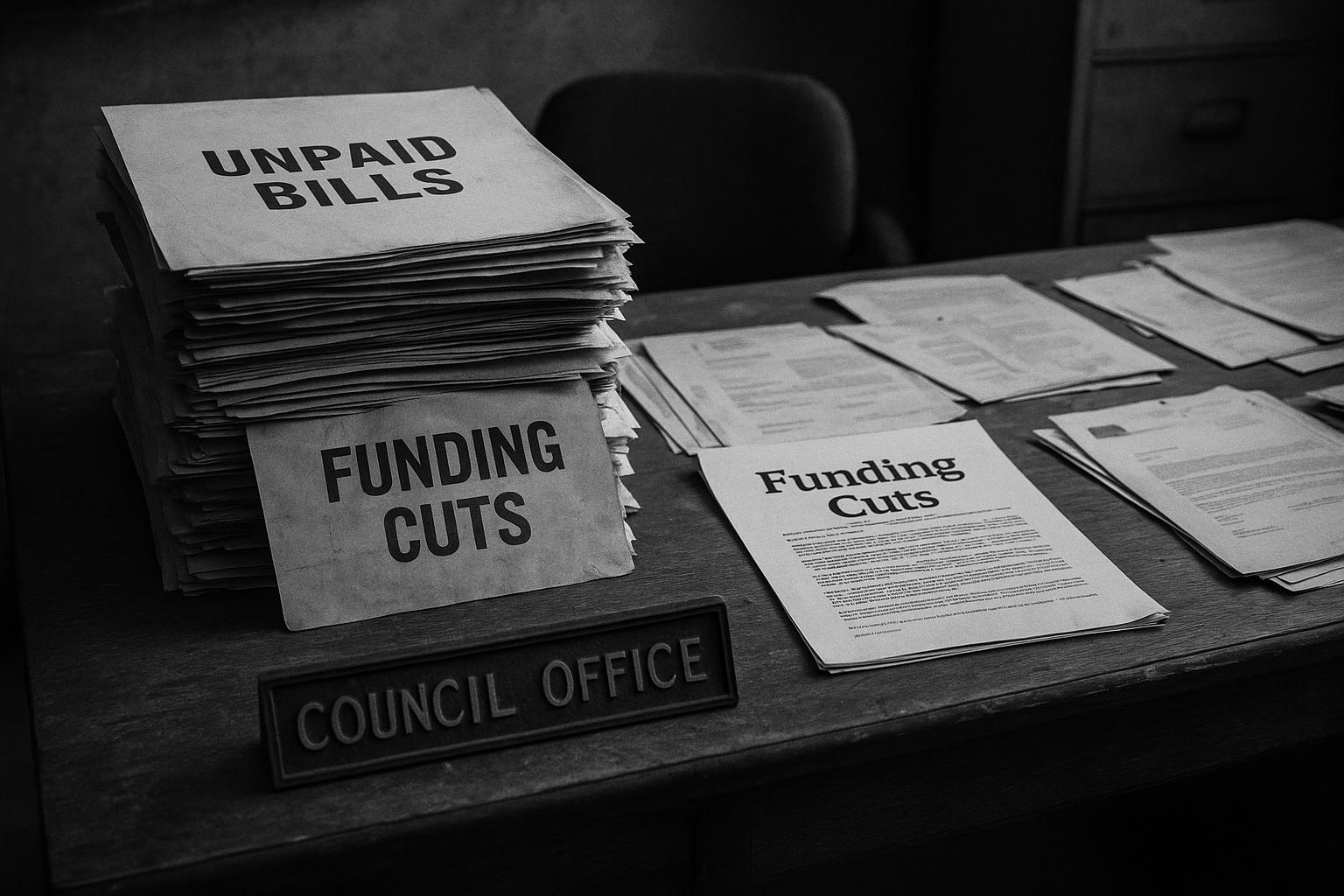Proposals to let English councils retain more local taxes offer an illusion of financial empowerment but risk worsening service delivery without addressing chronic underfunding and regional inequalities, experts warn.
Allowing councils in England to administer and retain a greater share of locally generated taxes might seem like a step toward empowerment—but it’s really just another way for the government to shift responsibility onto local authorities while neglecting core funding needs. A new report funded by the County Councils Network (CCN) claims that devolving portions of income tax, stamp duty, the apprenticeship levy, and introducing a tourist tax could provide councils with an extra £4.4 billion annually. This illusion of extra money, representing roughly 10% of local budgets and up to £8.9 billion nationwide, masks the reality that these figures are piecemeal and don’t solve the fundamental underfunding faced by public services across the country.
The analysis conveniently highlights that county areas—home to about 45% of the population—contribute nearly half of the UK’s tax revenue, but crucially, it ignores how these regions are struggling to deliver essential services amid austerity and government neglect. With income tax contributions at 62% and VAT at 55%, these regions are asked to contribute heavily without guaranteed reinvestment—yet the proposal to let councils keep some of these taxes is presented as an incentive for local economic growth, ignoring the fact that devolving taxes without sufficient resources often leads to worse service delivery, not better.
Richard Roberts of the CCN argues that these proposals are “not new taxes,” but that’s a simplistic view. In reality, it’s another way for the government to offload financial responsibility onto local authorities—who are already stretched thin—while claiming to empower local decision-making. Such fiscal devolution, he says, would unlock growth and jobs, but neglects to mention that councils are already crippled by inadequate funding and rising costs. It’s a false promise that local councils can fix a system fundamentally broken by central government austerity and cutbacks.
This push towards fiscal control echoes the broader devolution rhetoric championed by Labour’s front benches, notably Deputy Prime Minister Angela Rayner’s calls for local leaders to seek devolution deals. But beneath the promises of local control lies a cliff of underfunding and unmet needs. The government’s White Paper and new Bills aim to create a patchwork of local powers, but critics argue these are incomplete solutions that mask the failure of central government to deliver on promises of “levelling up.” Instead of genuinely empowering local authorities with meaningful resources, these measures often result in greater bureaucracy and fragmented services.
Labour’s plan to extend devolution to cover transport, skills, planning, and energy may sound appealing, but it’s a distraction from the urgent need for proper funding. The reality is that London and other regional centres face significant funding shortfalls—London Councils, for example, are dealing with a £500 million deficit—yet these initiatives often serve political agendas more than practical needs. The promise that regional mayors will receive more powers to stimulate growth fails to address the systemic gaps in funding that cripple local economies.
Experts warn that devolution’s success depends not just on transferring powers but on the financial arrangements that come with them. Without fair and adequate funding, these initiatives risk creating a tiered system of public services, where wealthier areas thrive while poorer regions continue to lag behind. Given the historical neglect and underfunding, it’s clear that more powers without proper resources will only deepen regional inequalities, not solve them.
In the end, these initiatives are another layer of superficial reform—promising local growth while perpetuating the core issues of resource disparity and government neglect. The focus should be on ensuring that the central government properly funds and supports local authorities, rather than offloading responsibilities and pinning hopes on unproven fiscal experiments. Until real funding gaps are addressed, these devolution plans amount to little more than a political distraction from the urgent need for a fairer, more accountable system that serves all communities equally.
Source: Noah Wire Services
- https://www.independent.co.uk/news/business/angela-rayner-government-english-england-b2789733.html – Please view link – unable to able to access data
- https://www.ft.com/content/c8aea65e-b16e-4972-8f5d-c20e3bf168bd – Deputy Prime Minister Angela Rayner has urged local leaders in England to seek devolution deals to gain new powers, thereby promoting decentralised decision-making. Labour’s proposed ‘Take Back Control Act’ aims to delegate responsibilities for transport, skills, adult education, job support, energy, and planning to local mayors. Despite existing deals covering 60% of England, many regions remain without agreements. Rayner cited Greater Manchester’s economic growth as an example of successful devolution. The new Labour government’s King’s Speech will introduce over 35 bills, including an employment rights bill, reforms to the House of Lords, and measures to give 16- and 17-year-olds voting rights. Additional legislation will cover water regulation, crime and policing, housebuilding, border security, and railway system management.
- https://www.ft.com/content/e585d9c7-826e-4d6a-acc3-2550badecc92 – Labour leader Sir Keir Starmer, alongside deputy Angela Rayner, will propose a significant devolution of powers in England as part of their local elections campaign. They aim to encourage all towns and cities not already covered by devolution deals to form combined authorities, which could take on responsibilities currently managed by Westminster. Existing combined authorities would gain more control over areas such as transport, skills, housing, planning, employment support, and energy. Labour pledges to ensure that all combined authorities develop local growth plans if they win the next election, moving towards a model that favors cooperation over competition among councils. Starmer criticizes the current government for failing to deliver on promises to ‘level up’ English regions, asserting that the economic disparity has widened under Conservative rule. The Labour party, leading significantly in polls, aims to unseat Conservative mayors in key areas during the May 2nd local elections.
- https://www.reuters.com/world/uk/uks-reeves-promises-more-power-englands-regional-mayors-2024-12-03/ – British finance minister Rachel Reeves announced that regional mayors across England will be given new powers to stimulate economic growth and attract investment, during a visit to Hull. This initiative aims to address the economic disparity between London and other regions. A forthcoming policy document on English devolution will detail new partnerships between city regions, led by mayors, and the Department for Business and Trade. Reeves emphasized the need for local leaders to collaborate with businesses and universities to harness innovation for regional growth. The move is part of Prime Minister Keir Starmer’s Labour government’s goal to ensure job creation and productivity improvement nationwide.
- https://www.ifs.org.uk/articles/devolution-may-be-sexier-updating-local-government-finance-system-vital – The Institute for Fiscal Studies discusses the importance of updating the local government finance system alongside devolution efforts. While devolution is often seen as a means to empower local authorities and boost economic performance, the article highlights that the effectiveness of devolution depends on what is devolved, to which areas, and the accompanying funding and redistribution arrangements. The piece emphasizes the need for a comprehensive approach to local government finance to ensure that devolution leads to tangible benefits for local communities.
- https://www.bbc.co.uk/news/articles/c30n72j4nrqo – The BBC outlines how the proposed devolution plans in England could affect residents. Mayors will be required to develop local growth plans to stimulate the economy, collaborating with major employers, universities, colleges, and industry bodies to identify growth sectors. Local leaders will also need to implement conditions for growth, such as aligning college courses and Jobcentre support with local skills gaps. The government believes that local leaders have a better understanding of their area’s strengths and ambitions than central government. Additionally, mayoral devolution deals often come with a 30-year investment fund and may include powers to charge their own precept on council tax.
- https://www.gov.uk/government/news/deputy-prime-minister-kickstarts-new-devolution-revolution-to-boost-local-power – Deputy Prime Minister Angela Rayner has pledged to initiate a new devolution revolution to transfer more powers from Westminster to local communities. In her letter to local leaders, Rayner invites regions without devolved power to partner with the government to deliver the most ambitious programme of devolution the country has ever seen. She urges local leaders to take on powers in areas like transport, adult education and skills, housing and planning, and employment support, enabling them to make decisions that benefit their communities and boost economic growth.
Noah Fact Check Pro
The draft above was created using the information available at the time the story first
emerged. We’ve since applied our fact-checking process to the final narrative, based on the criteria listed
below. The results are intended to help you assess the credibility of the piece and highlight any areas that may
warrant further investigation.
Freshness check
Score:
10
Notes:
 The narrative is fresh, published on 16 July 2025. No evidence of prior publication or recycled content found. The report is based on a recent analysis commissioned by the County Councils Network, indicating high freshness.
The narrative is fresh, published on 16 July 2025. No evidence of prior publication or recycled content found. The report is based on a recent analysis commissioned by the County Councils Network, indicating high freshness. 
Quotes check
Score:
10
Notes:
 No direct quotes are present in the provided text, suggesting original content.
No direct quotes are present in the provided text, suggesting original content. 
Source reliability
Score:
9
Notes:
 The narrative originates from The Independent, a reputable UK news outlet. The County Councils Network is a legitimate organisation representing county councils in England. No unverifiable entities or fabricated information identified.
The narrative originates from The Independent, a reputable UK news outlet. The County Councils Network is a legitimate organisation representing county councils in England. No unverifiable entities or fabricated information identified. 
Plausability check
Score:
8
Notes:
 The claims about devolved tax powers potentially adding £4 billion for local services are plausible and align with ongoing discussions about fiscal devolution in England. However, the narrative lacks specific supporting details from other reputable outlets, which would strengthen its credibility.
The claims about devolved tax powers potentially adding £4 billion for local services are plausible and align with ongoing discussions about fiscal devolution in England. However, the narrative lacks specific supporting details from other reputable outlets, which would strengthen its credibility. 
Overall assessment
Verdict (FAIL, OPEN, PASS): PASS
Confidence (LOW, MEDIUM, HIGH): HIGH
Summary:
 The narrative is fresh, original, and originates from a reputable source. While the claims are plausible, the lack of supporting details from other reputable outlets slightly reduces confidence. Overall, the narrative passes the fact-checking criteria with high confidence.
The narrative is fresh, original, and originates from a reputable source. While the claims are plausible, the lack of supporting details from other reputable outlets slightly reduces confidence. Overall, the narrative passes the fact-checking criteria with high confidence. 














